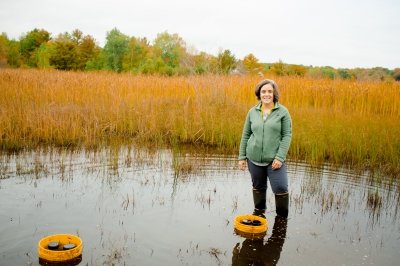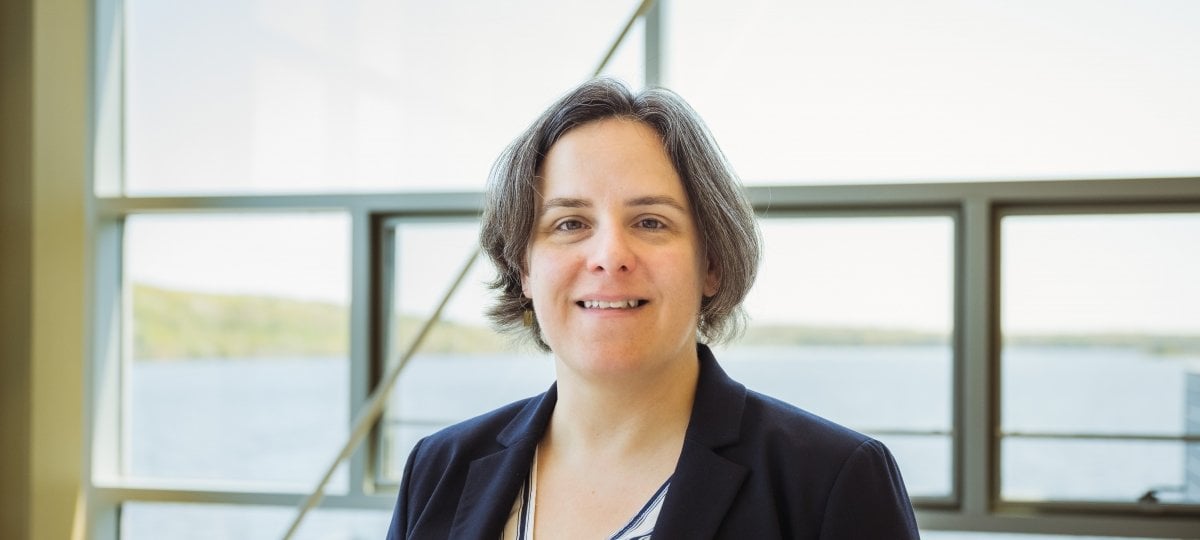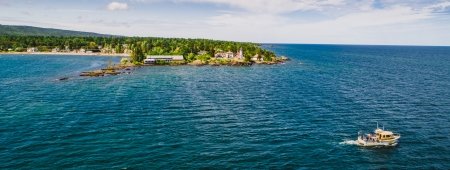Amy Marcarelli is the recipient of Michigan Technological University’s 2023 Distinguished Teaching Award in the Associate Professor/Professor category.
Amy Marcarelli is a professor of biological sciences and an ecosystem ecologist with interests in energy and biogeochemical cycles in freshwater bodies. She received her bachelor’s in biology from Colgate University and her Ph.D. in ecology from Utah State. She is the director of both the Ecosystem Science Center and the Aquatic Analysis (AQUA) shared facility at Michigan Tech. Her research applies across aquatic habitats, including streams, rivers, wetlands, lake littoral zones — the sloping area where sunlight reaches from the lake’s surface all the way to the sediment, located between the shore and deeper water — and the nearshore regions of the Great Lakes.
"Amy Marcarelli is a true example of the teacher-scholar model. She maintains an active research program studying ecology of aquatic ecosystems and has administrative duties as the director of our Ecosystem Science Center on campus. Yet she also devotes vast time and talent to doing an outstanding job in the classroom, introducing our students to the remarkable ecology of Lake Superior, involving them by the dozens in research in her laboratory, and preparing students for graduate school and careers. Michigan Tech is fortunate to have Dr. Marcarelli on our faculty."
Q: How would you describe your teaching style?
AM: The three words I would use to describe my teaching style are interactive, enthusiastic and inclusive. I use a combination of inquiry-based exercises, short lectures that integrate data and primary literature, group work, and discussion to engage students in active learning. I strive to create a classroom where students are eager participants and where students and I learn from each other, sometimes by explaining basic concepts and sometimes by engaging in deep and difficult conversation. All of my classes are built with the goal of creating inclusive classroom communities characterized by mutual trust and respect. I love the topics that I teach, and I love sharing them with students, and I try to let that shine through in every class session.
Q. In addition to classes in ecology and aquatic systems, you teach a graduate seminar in professional development for scientists. Could you describe that course and why you enjoy teaching it?
AM: BL5025 The Scientific Profession arose from conversations with graduate students during my interview. They expressed a need for more professional training around the countless things that we do as scientists — presenting at conferences, negotiating salaries, managing budgets, mentoring students, and on and on. Over the 10 years that I taught this course, it evolved into a student-centered, active-learning advanced responsible conduct of research (RCR) certification course that drew graduate students from campus. The course content was one-third topics required for RCR, one-third preparing an application packet for a job or fellowship and one-third topics selected by students that varied each year based on their interests and future goals. My informal nickname for this class was “group therapy for graduate students.” My favorite part of teaching it was watching the community the students formed based on their shared experiences in graduate school at Michigan Tech — and despite coming from different degree programs, colleges, backgrounds and countries.
Although I don’t teach BL5025 anymore, this course was an inspiration and model for a new undergraduate course that I do teach: BL4600 Professional Development Capstone for Biological Sciences. In this course, seniors from Department of Biological Sciences majors reflect on the experiential learning they completed for their degrees and learn to compose clear and compelling materials for applying to jobs, graduate schools and other opportunities. I am enjoying the opportunity to get to know each of these students, and to help them think strategically about their future and consider how their biology training has prepared them for life after Michigan Tech.
"Amy is not just passionate about educating the next generation of students, but also very kind to her students and creative with her courses. We greatly appreciate her dedication and contributions to the teaching mission of Michigan Tech."
Q: What instructional methods or philosophies do you use to make successful learning experiences happen in your classrooms?
AM: There are two central principles that structure my teaching philosophy: We must educate students as whole people, and they must understand the social and societal context in which we work.
As a first-generation college graduate and Ph.D., I believe in transparency of expectations for all students. I build a clear vision of the structure and purpose of each course, which I share with the students through detailed syllabi and comprehensive materials on Canvas at the start of the semester. I strive to provide each student with what they need to succeed, from flexibility in deadlines, to supplementary material to enrich classroom learning, to mentoring for life after college.
Distinguished Teaching Award
Since 1982, the annual Michigan Tech Distinguished Teaching Award has been awarded in two categories: Associate Professor/Professor and Teaching Professor/Professor of Practice/Assistant Professor. The award nomination and review processes are student-driven; finalists are selected based on student ratings regarding quality of instruction. Winners receive $2,500 and a plaque at an awards dinner sponsored by the Office of the President in the fall.
I think students learn best when they can find some personal connection to the topics, whether that’s in relation to their future careers or to their personal lives. In some classes, like the Professional Development Capstone, it’s easy to make this connection. In others, it’s more difficult. For example, in BL3400 Principles of Ecology and BL2001 Valuing the Great Lakes, fewer than half of the students are majoring in ecology or environmental sciences — the majority are majoring in health sciences or engineering. Therefore, my goal in these courses is for students to become ecologically informed citizens, ready to understand the ways that ecological principles affect their day-to-day lives and the sustainability of human societies. We discuss primary literature and news stories in class and laboratory sessions, and conduct field and lab experiments to understand how ecological data is gathered and synthesized. These experiences help students to understand that science is a social endeavor with strengths and biases that we must recognize to address the wicked problems facing the Earth’s ecosystems and the human societies that rely on them. It makes the class relevant to everyone, regardless of their major or what they plan to do in the future.

Q: What drew you to study biology and ecology as a student?
AM: My earliest exposure to ecology was as a Girl Scout. With the Scouts, I learned basic natural history, leave-no-trace camping and hiking, and had my earliest formative adventures in the forests and mountains of New York. In high school, I discovered that I was interested in (and good at) both biology and chemistry. I started college as a pre-med major, drawn by the prestige and long-term earning potential of a medical career — but, I quickly realized that I was more interested in research than in a clinical career. I spent a few years not quite sure where I “fit” in biology until, in my junior year, in an attempt to complete my degree requirements quickly so I could apply for study abroad programs, I enrolled in Ecology and Phycology (the study of algae) in the same semester. In these courses, I discovered biogeochemistry, which is the study of the mutual interactions between the biology and chemistry of the Earth system, and fell in love with limnology, or the study of inland waters. These fields merge my love of the outdoors with my interest in biology and chemistry, and have been my intellectual homes ever since.
Q: Who (or what) inspired you to become a teacher?
AM: Part of me has always wanted to teach. As a high school tutor, I learned I was good at explaining things to others, and I first felt the satisfaction that comes when someone you are working with finally “gets” a challenging concept. But I also wasn’t interested in teaching elementary (too much chaos!) or high school (too much drama!). As an undergraduate, I realized there was another option — to teach as a university professor — and that quickly became my career goal.
This past fall, I visited my undergraduate alma mater for the first time since I graduated. As I walked around campus and visited with professors and friends, I was reminded of the lessons I learned in my biology classes — how to design experiments, conduct sensitive lab analyses and to communicate my ideas clearly and concisely. I also remembered the other classes outside of my department, in literature, history, women studies, music theory, sociology and philosophy. Those classes were so important for challenging my assumptions about how the world worked. The most memorable classes crossed disciplines and challenged us to think about our futures as citizens and as people. Those classes are the ones that inspired the courses I now teach at Michigan Tech, focused on professional development and on learning about aquatic ecosystems in terms of what they mean to us as citizens and scientists. I am eternally grateful for those professors who showed me the way that I wanted to teach in the classroom, and am so grateful for all the Michigan Tech students who have come to my classes over the years ready and excited to engage in these collaborative learning experiences.
Q: What opportunities does this award open up for you?
AM: This award comes at an interesting time in my career. In 2022 I became director of the Ecosystem Science Center, and so I am spending less time in the classroom. My most sincere hope is that I can continue to teach the professional development and non-major courses that I love. And, maybe this will encourage students from other departments to enroll in one of my courses, like BL2001 Valuing the Great Lakes or the summer BL 4421/5421 Lake Superior Exploration, because my favorite classes are when students from different departments and disciplines come together to learn together!
Michigan Technological University is an R1 public research university founded in 1885 in Houghton, and is home to nearly 7,500 students from more than 60 countries around the world. Consistently ranked among the best universities in the country for return on investment, Michigan's flagship technological university offers more than 185 undergraduate and graduate degree programs in science and technology, engineering, computing, forestry, business, health professions, humanities, mathematics, social sciences, and the arts. The rural campus is situated just miles from Lake Superior in Michigan's Upper Peninsula, offering year-round opportunities for outdoor adventure.






Comments